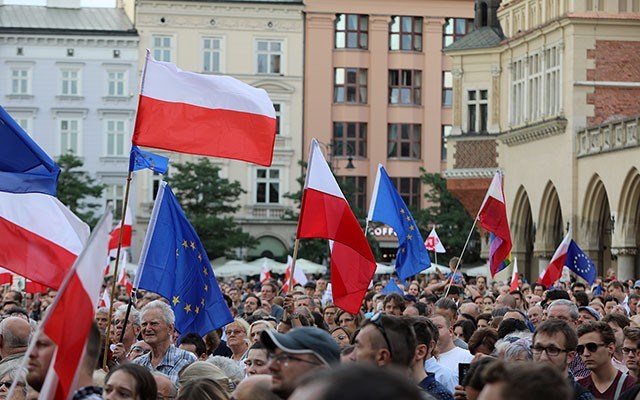Zofia Romaszewska, now in her 80s, was jailed during the years of martial law in Poland in the early 1980s. She is a national hero for her human rights activities in the 1980s and is now one of President Andrzej Duda's advisers. Last week, she persuaded him to veto the government's new laws on the courts.
She told him: "Mr. President, I lived in a state (under Communist rule) where the prosecutor general had an unbelievably powerful position and could practically do anything. I would not like to go back to such a state." And President Duda actually listened to her.
This came as a complete surprise, because Duda was a member of the ruling Law and Justice Party and is widely seen as a puppet of its leader, Jaroslaw Kaczynski. On Monday, however, he rejected new laws giving the justice minister the power to fire judges he doesn't like — including, potentially, the entire Supreme Court — and choose the new judges who take their places.
"As president I don't feel this law would strengthen a sense of justice," Duda said in a statement — or rather, an understatement — on national television. His action has greatly encouraged the hundreds of thousands of people who have been demonstrating in cities all over Poland against the new laws, but there are still many who doubt his sincerity.
Poland is sharply divided between the populists, socially conservative, deeply Catholic, and ultra-nationalist, who form the present government, and the opposition whom they label "the system" or "the elite." This system allegedly includes both the liberals who led Solidarity's resistance to Communist rule, and the crypto-Communists who supposedly still exist and are now in league with the liberals.
The whole thing is a paranoid fantasy, but it has a firm hold on many people's minds in a national culture that wallows in victimhood and self-pity. The Law and Justice government, elected in late 2015 with an absolute majority in parliament, denounces the opposition parties as corrupt traitors under foreign influence, and they in turn mistrust everything the government says and does — including President Duda's change of heart.
He's just playing for time, they think. He'll get the demonstrators to go home and then he'll sign some slightly altered version of the laws stripping the judges of their independence. And maybe they are right. Nobody will know for sure until they see the government's response to his veto.
This is not just about Poland. It is about whether the EU will tolerate an undemocratic government in its midst, and the evidence isn't in yet.
The EU is probably the only reason that the former Communist-ruled states of Eastern Europe almost all became democracies. They desperately wanted to be members of the EU as a safeguard against renewed Russian interference in their affairs — and the EU insists that all its members be democratic.
Not only that, but it carefully defines how democratic states should behave, and a basic principle is the separation of powers: the courts must not be under government control. When the Law and Justice Party introduced laws that started taking away the judges' independence, it ran head-on into the EU's rules for membership.
Senior EU officials were openly talking about stripping Poland of its voting rights in the Council of Ministers (the closest thing to an EU government) until Duda said he would veto the new laws. If it turns out that he is only playing for time and will soon sign quite similar laws, the confrontation will resume — and the EU might even resort to financial measures against Poland.
The Polish government cannot plausibly threaten to quit the European Union: 75 per cent of Poles see EU membership as a vital counter-balance to the looming presence of Russia to their east. The EU holds all the best cards in this game, if it chooses to play them.
But will it?
That is not clear. The EU is not famous for its willingness to take bold action, and it would have to overcome the opposition of Hungary, another ex-Communist EU member that also has an authoritarian government (though a less extreme one). But the EU's own cohesion would suffer if it did not defend its fundamental values, so if Duda is only fooling there may be a real showdown in a month or two.
Gwynne Dyer is an independent journalist whose articles are published in 45 countries.




